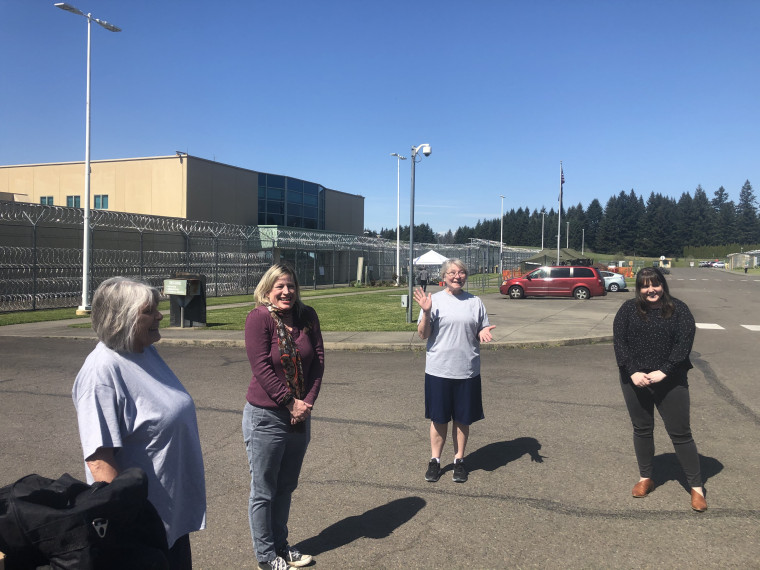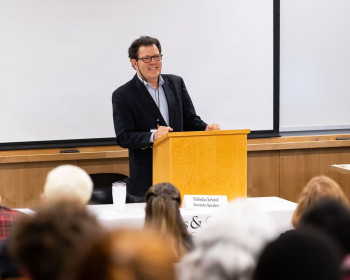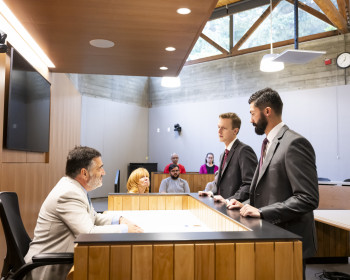CJRC Clients Receive Clemency and Win Parole
Open gallery

Governor Kate Brown commuted two clients of the Criminal Justice Reform Clinic (CJRC) at the beginning of April. Suzanne Miles and Patricia Butterfield both applied for clemency in 2018 and were released from Coffee Creek Correctional Facility on April 10, 2020. A third client of CJRC, parolee Joshua Wilburn, was released nearly three months early on April 20th. The Clinic submitted 80 pages of material, including a parole plan, and represented him in his hearing in from of the Parole Board this past fall; Mr. Wilburn was successful at both his murder review hearing then and at his exit interview on March 16, 2020.
Butterfield is 74-years old, one of the oldest women in DOC custody. She was incarcerated for more than 22 years now and Suzanne Miles, 57, was incarcerated for 20 years. “Both of these women were incredible candidates for clemency, the governor was already reviewing them and interested in them,” said Aliza Kaplan, director of the Criminal Justice Reform Clinic. “Both women also have medical conditions that made them vulnerable to the COVID-19 virus so we advocated for their release based on that as well, but I am not sure if that played a role in the governor’s decision, we are just thrilled they are home with their families” Kaplan stated.
CJRC’s clemency petition for Butterfield explored how over the past twenty years she has worked to change herself by learning from her mistakes, addressing her failures, and becoming a better person. She suffered from childhood abuse and severe depression that led to abusive relationships later in life. During her time in prison, Butterfield acted as a mother to many other inmates, counseling them and helping them cope with despair. Butterfield is looking forward to living with her daughter and continuing to build relationships with all three of her daughters and their families now that she is released.
Suzanne Miles spent the past 20 years in prison working on improving her mental health and severe depression, which was undiagnosed at the time of her sentencing. Despite an abusive childhood and being in an abusive relationship, Miles has transformed herself during her incarceration and for the first time has control of her own life, actions, mental health and is thriving. Miles is looking forward to being able to be a mother, grandmother, and enjoy her life free from the abuse, neglect, and torment she has suffered in the past.
Students played an important role in drafting the clemency petitions for these clients. Under supervision, CJRC students working on clemency petitions participate in all aspects of the case including interviewing the clients several times, regularly communicating with the clients’ family and friends to get letters of support, conducting important legal and social science research related to the case, reviewing all case materials beginning at arrest, and drafting the petitions.
As a second-year law school student, Brittany Hill ’19 assisted in writing Miles’ clemency petition while a clinic student in the CJRC in 2018. “I worked closely with Suzanne, visiting and interviewing her numerous times,” Hill said. Hill reviewed trial transcripts, police records, case law, and conducted interviews to draft the clemency petition telling Miles’ story. “Working on Suzanne’s clemency petition was easily a highlight of my law school career,” Hill reflected. “It solidified my desire to devote my legal career to criminal justice reform.”
Hill was there when Miles was released, though due to the COVID-19 pandemic, the women respected social distancing standards and remained six feet apart. “I’m so proud of Suzanne,” stated Hill. “This is her triumph. I have no doubt that Suzanne will continue to flourish and make a positive impact on her community. I’m so happy for her and her family.”
CJRC also received the good news that their parole client, Joshua Wilburn, will be released nearly three months early. CJRC submitted an extensive parole memorandum and supporting materials to the Parole Board for their consideration along with participating in both his hearings before the Board. The Board determined that Wilburn was eligible for parole and originally set his release for July 9, 2020. However, Wilburn was approved for an expedited release on April 20, 2020. CJRC students working on parole cases under supervision have the opportunity to conduct interviews of the clients, draft parole memoranda, research legal issues, prepare the client for 4-5 hour hearings, and conduct the hearings.
CJRC student Taylor Rose ’21 worked on Mr. Wilburn’s case all year. “Going through this process with Joshua was such a beautiful example of someone able to carefully piece together the broken pieces of their past to create something wonderful for their future,” stated Rose. “Working with Professor Kaplan and Clinic attorney Mieke de Vrind ’19 on this project helped to shape and define my legal career in such a monumental way, and the fact that we get to celebrate his release with him and his family is truly so special for me.”
Wilburn always felt treated with respect and kindness from CJRC, Professor Kaplan, and the students. “I would first like to express my deepest gratitude to everyone who worked on my case,” Wilburn stated about CJRC. “I got the feeling from our very first phone call that they [CJRC] were sincere in their desire to represent their clients as best as they possibly could, regardless of their financial status,” Wilburn stated.
“I am smiling at this very moment just thinking about the connection we made on the human level,” Wilburn said. “I love each of them, and consider them members of my extended family. Because of their commitment to serving others, I have now regained my liberty, and am with my immediate family in a safe and wholesome environment. Is this not our duty to one another?”
Law Communications is located in room 304 of Legal Research Center (LRC) on the law Campus.
MSC: 51
email jasbury@lclark.edu
voice 503-768-6605
Cell: 626-676-7923
Assistant Dean,
Communications and External Relations, Law School
Judy Asbury
Law Communications
Lewis & Clark Law School
10101 S. Terwilliger Boulevard MSC 51
Portland OR 97219

